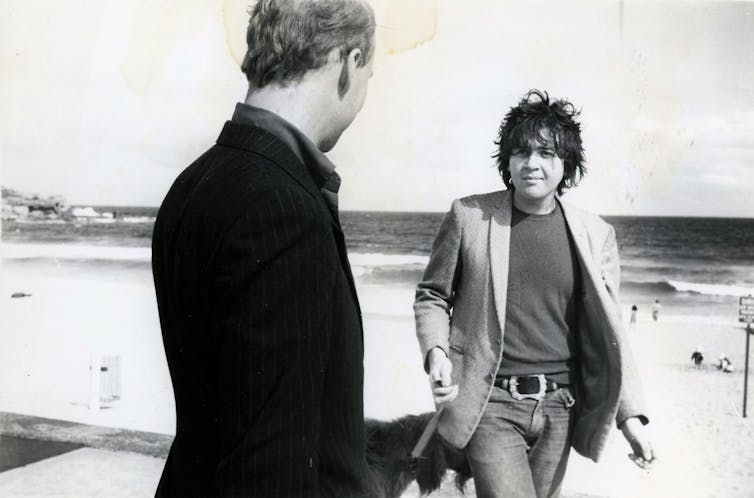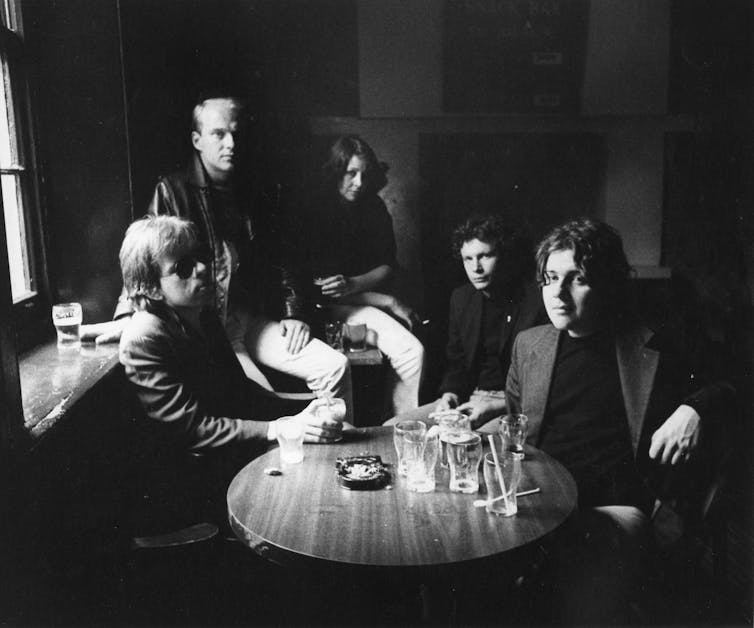
The Saints (Chris Bailey, Bruce Callaway, Janine Hall). Picture by Judi Dransfield Kuepper, Author provided (no reuse)
Inala in the early 70s was bleak. A Brisbane suburb of wide dusty streets, treeless and bland. A planned community, meant to grow over time. Austerity, accented by the cheap houses – weatherboard, red brick, concrete – stifled the suburb like a blanket on a hot February night.
It was boring. Beyond boring. The only concession to communal childhood joy was the pool, and the crazy concrete skate rink. But if you wanted a creative outlet, you needed to search elsewhere.
Ivor Hay, (future Saints drummer), was heading to the picture theatre in Sherwood one Saturday night in early 1971:
and I saw Jeffrey [Wegener – another Saints drummer] with these two longhairs, Chris [Bailey] and Ed [Kuepper]. They were off to a birthday party in Corinda and asked me along. That was our first night.
Bailey was raised by his mum, Bridget, in a house alive with siblings – mostly girls, who looked after the kid. He got away with a lot.
“None of us had a lot of money,” Hay tells me.
Both Chris and I were raised by single mums in reasonably sized families. Chris’ mum was pretty feisty, with this Belfast accent which was just fantastic. They all looked after ‘Christopher’, he could do all sorts of things and they would accommodate him. His mum would have a go at him about the noise, but we’d just go to his bedroom and rehearse and bugger everybody else in the house!
Kuepper taught Hay to play the guitar: Stones and Beatles and Hendrix. Hay passed the knowledge down to Bailey, who was keen to learn. Neither Kuepper nor Bailey learned to drive, so Hay became the driver in those wide suburbs where driving and cars were everything.
There was politics in Bailey’s house – his sister Margaret chained herself to the school gates to protest uniform policy – but this pervaded the town. The conservative government had no time for the young, and the police force did their best to make life difficult.
But there was a sense that these young men were making something new. As Hay says:
We used to sing The Internationale at parties. I don’t know if we were revolutionaries, but we had that sense that something was happening. [With the band] we were doing something that we thought was going to change something. Chris was particularly good at pushing things, at being anti-everything.

Out of Inala
To escape the suburb was to head north to the railway line. It was the lifeline to the centre of Brisbane – record stores, bookshops and other forms of life.
Kuepper remembers going into the city with Bailey.
We had intended to steal a record, and we went into Myers […] both wearing army disposal overcoats […] these two long haired guys walking into the record department with these overcoats […] surprisingly enough, we were successful!
Like the railway line, Ipswich Road joins Brisbane to the old coal town of Ipswich. It slices through these western suburbs, carrying hoons in muscle cars and streams of commuters, the occasional screaming cop car or ambulance.
On Thursday nights, the boys used to sit at the Oxley Hotel, overlooking Ipswich Road, “just sit up there having beers, we wouldn’t have been much more than 17 or 18 at that time. Chatting about all sorts of stuff,” says Hay.
Chris and Ed were comic collectors and Stan Lee was the hero […] there were political discussions, philosophical discussions. Those guys could talk underwater.
They talked and played and sang. And Bailey had the voice. It was a force, not just loud and tuneful, but full of snarl and spit.
Soon they had songs, and in 1976 scraped the money together to record and release their first single on their own Fatal Records label. (I’m) Stranded took Bailey out of Inala, out of Brisbane and into the world.
He never looked back.

A changed city
The Saints released three albums in as many years – (I’m) Stranded, Eternally Yours and Prehistoric Sounds – before Kuepper and Hay returned from the UK to Australia, leaving Bailey to his own devices.
Bailey remained in Europe, releasing a cluster of solo albums and many Saints records over the next 40 years. He wrote some achingly beautiful songs. It is a testament to his talents as a songwriter that Bruce Springsteen recorded a version of Bailey’s Just Like Fire Would in 2014.
There’s no doubt that Bailey and The Saints changed Brisbane forever. People around the world who love music know Brisbane exists because of The Saints, The Go-Betweens and bands like them.
Peter Milton Walsh (The Apartments) was one of many who benefited from The Saints legacy:
They blazed through our young lives like comets. Showed so many what was possible – that you could write your way out of town.
“Without The Saints,” Mark Callaghan of The Riptides/Gang Gajang told me, “we probably wouldn’t have started. ”
They just made it all seem doable. It was like, ‘Well, they’re from Brisbane!’ So we started our first band, and at our first gig we covered (I’m) Stranded! We even took a photo of the abandoned house in Petrie Terrace with (I’m) Stranded painted on the wall. But it never crossed our minds to stand in front of this. It would be sacrilege, you know? And we were trying to work out a way that we could get it off the wall intact, because we recognised it was a historical document.
Chris Bailey isn’t the first of our creative children to leave this life behind and move on into memory. With their passing, like the returning comet, the past is freshly illuminated, allowing us to look back at our young lives. Back when the future was broad in front of us, urged on by voices like Bailey’s to open our eyes and see the world.
And Bailey’s was a unique voice. Kenny Gormley (The Cruel Sea) remembers him singing Ghost Ships:
But ah, I’ll never ever forget seeing Chris pick that shanty, alone at sea in a crowded room, holding us sway, wet face drunk and shining, quiet and stilled in storm, cracked voiced with closed eye and open heart. And that was Bailey, a gentleman with the mad soul of an Irish convict poet.“
This article was written by:
Disclosure statement
John Willsteed would like to thank Ivor Hay, Mark Callaghan and Courtney Pedersen, for talking to him for this piece, and Ed Kuepper, Peter Milton Walsh and Kenny Gormley for their words.






